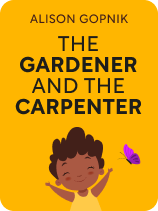

This article is an excerpt from the Shortform book guide to "The Gardener and the Carpenter" by Alison Gopnik. Shortform has the world's best summaries and analyses of books you should be reading.
Like this article? Sign up for a free trial here.
How is modern parenting missing the mark? Why do so many people treat their parenting role as a job?
There’s no doubt that parenting isn’t easy. While there are many reasons why this is, The Gardener and the Carpenter by Alison Gopnik says that the main one is that modern society encourages parents to raise children based on what they want them to be as adults and focus less on who they are now.
Let’s look at why modern parenting is failing children today.
Parenting: The Gardener Versus the Carpenter
Gopnik explains that our approach to raising children in modern society, particularly in American culture, is flawed because it focuses on a desired outcome when it should instead focus on creating a supportive environment that allows children to discover and explore their uniqueness and individual places in the world. It also treats being a parent like a job when it’s actually a relationship built on love.
Gopnik uses the analogy of a carpenter and a gardener to explain these modern parenting issues. A carpenter decides in advance what they want to create, and then they shape and mold their material to match their blueprint, avoiding any kind of variation or deviation from that predetermined idea. In contrast, a gardener lays a foundation for growth, providing the resources needed to create and nourish life, but allowing that life to find its own path and grow and change according to its own needs. Our current model pushes parents to be carpenters when they should be gardeners.
This flawed parenting model is reflected in the many parenting books that supposedly provide instructions for how to turn a child into a happy, successful adult, as well as the education system that measures children’s value according to their test scores and then uses those same scores as predictors of their adult outcomes.
Parenting Styles
For Gopnik, there are only two parenting styles: the gardener and the carpenter style. However, other psychologists believe there are four parenting styles, and we can compare those styles to Gopnik’s two-style framework to gain further insights into it.
Psychologists Eleanor Maccoby and John Martin use a grid of four boxes to describe four parenting styles. This grid has two axes: One axis contrasts demanding and undemanding parenting styles, and the other contrasts warm (accepting and loving) and cold (emotionally distant) styles.
These styles intersect to produce four categories:
- Authoritarian (demanding and cold)
- Authoritative (demanding and warm)
- Permissive (undemanding and warm)
- Neglectful (undemanding and cold)
The carpenter style as described by Gopnik aligns with either the authoritarian or authoritative styles, both of which are demanding. Her gardener style aligns with an undemanding style—but not with a cold, unemotional style, so it would align most closely with the permissive parenting style.
Many psychologists disagree with Gopnik’s favoring of a permissive style and instead recommend an authoritative parenting style, noting that children raised under this style appear to have the best outcomes in areas like happiness, self-esteem, school performance, mental health, and relationships with their parents. Some psychologists suggest that children raised under a permissive style have worse outcomes than either the authoritative or authoritarian styles. They note that children raised permissively have trouble following rules and exercising self-control, lower self-esteem, and more problems in their relationships.
However, another style that’s not incorporated into the four-style framework (and which may fit more closely with Gopnik’s advice than any of the four) is gentle parenting. This style requires an understanding of children’s developmental levels and centers on treating your child with empathy, respect, and understanding while also establishing and enforcing boundaries. As with the authoritative style, it involves teaching children self-discipline and enforcing boundaries, but it treats children more like adults and doesn’t use harsh punishments. It also urges parents to model good behaviors and focus on positive encouragement of desired behavior rather than discouragement of bad behavior.
The Carpenter Society Is Letting Down Children and Parents
While parents may be the main adult influence in children’s lives, raising children is a societal endeavor and requires a large-scale investment in their care. Gopnik argues that society and its child-caring institutions need to take on the gardener model to best support children and parents.
Though child care has always been a fundamental facet of human existence, it changed drastically during industrialization. Previously, most families in America were farmers, so both parents (and often other family members) were able to work and take care of their children all day. With industrialization, the workplace became separated from the home, leading to the rise of the nuclear family in which the father worked while the mother stayed home with the children. And soon that changed as well, as mothers began entering the workforce and children began living in families where both parents worked—or in single-parent households where the parent simultaneously worked and raised the children.
In the years since this shift occurred, the financial costs of child care have risen dramatically and currently fall largely on parents—as opposed to the ancient model in which communities pooled their resources to take care of children. Gopnik cites a statistic that it costs about $245,000 to raise a child. Because of these costs and the lack of community investment, parents have to choose between working (which means they have to find a way to pay for child care from someone else) and staying home with their children (which means they can’t earn the resources they need to raise their children).
The worst effects of this lack of community investment fall on children themselves. According to Gopnik, more than 20% of children in America grow up in poverty. Poverty also has a cyclical effect, so children who grow up in poverty are more likely to remain poor and raise their own children in poverty.
(Shortform note: Poverty also affects different social groups to varying degrees, with people of color and households led by women suffering the most: Almost 60% of poor children live in a household provided for by a single woman. Meanwhile, for Black, Latinx, and Native children, the rate of poverty is closer to 25%. What’s more, only 16% of poor children are ultimately able to become financially successful, while the rest remain stuck in the cycle of poverty.)
Gopnik suggests that we need to reinvest in children as a society, offering support to parents through interventions like universal child care, paid parental leave, and direct financial support. Studies show that interventions like these have long-lasting benefits for children and lead to greater health and prosperity in adulthood.
(Shortform note: The benefits of interventions like those Gopnik describes are supported by research. In 2021, in response to the COVID-19 pandemic, the government instituted an expanded child tax credit that managed to cut child poverty by nearly a third (though the program was ended after six months). And while Gopnik’s suggestions for greater societal investment are rather general, other experts have more specific recommendations, such as increasing the minimum wage from $7.25 to $10.25, increasing SNAP benefits by 20%, and providing a monthly child allowance of at least $166 per child.)

———End of Preview———
Like what you just read? Read the rest of the world's best book summary and analysis of Alison Gopnik's "The Gardener and the Carpenter" at Shortform.
Here's what you'll find in our full The Gardener and the Carpenter summary:
- The difference between gardner and carpenter parenting styles
- Why parenting should not be a form of work but an act of love
- How the schooling model fails to effectively support children’s learning






